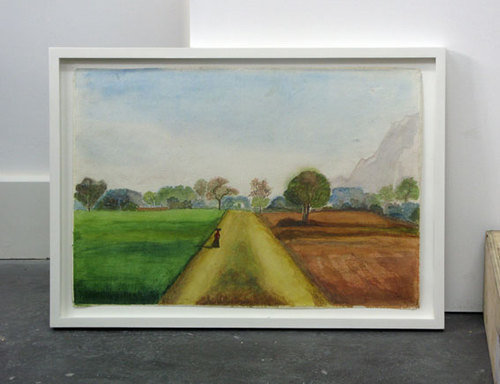24/10/2007
David Blamey
Four, Dublin
D.B. The artist presents two new works that correspond to the spatial peculiarities of the gallery. Commonplace in their materiality, and yet monumental in their transformative presence, the works address the constraints of the exhibition space by taking us beyond it. Curated by Paul O'Neill.

D.B.
curated by Paul O’Neill
For his first solo exhibition in Ireland, David Blamey will present
two new works that correspond to the spatial peculiarities of the
gallery at Four. Commonplace in their materiality, and yet monumental
in their transformative presence, the work addresses the constraints
of the exhibition space by taking us beyond it. With references
spanning the quotidian photography of Ed Ruscha and Christian
Boltanski, the iconography of spiritual organizations, minimalism,
mysticism, system theories and global tourism, this presentation
extends Blamey's reputation for meticulousness and fastidious
under-production. His works are presented as quietly assisted
ready-mades awaiting the viewer's scrutiny and ultimately, their
evaluation. In so doing, the exhibition D.B. raises questions about
how qualitative values in art can be produced without obvious cultural
agency.
Continuing his on-going series of pin drawings on fabricated panels,
Pin Board 2, (2007) is a scaled-up notice board almost entirely
covered with office pins. Upon closer inspection, this mass of colours
and sizes registers a multitude of small disparities that stem from
the varied geographic sources from which they originate. Blamey
states, "If you compare a 1/16" diameter round head pin manufactured
in the US with the same type of thing made in Spain or the UK, you
will find differences. Subtle inconsistencies in production values
have allowed me to accumulate a range of colour variations and sizes
from all over the world that creates, in accumulation, a sense of
space." Through a laborious process of gathering, drawing and
building, these works turn on the possibility of transforming
commonplace materials into a satiated map of the universe, with so
many places, times and points of intersection and (in-) significance.
Pin Board 2 remains ambivalently positioned between a commonly
employed bulletin board with all its notices removed and the highly
crafted embodiment of a contemplative spatial illusion. The effect is
one of pleasurable disorientation.
In Road, (2007) row upon row of individually framed watercolours hang
in a grid. These paintings by unknown Indian art students were
purchased by Blamey during two trips to Mumbai's so-called Thieves'
Market (Chor Bazaar) in 2005 and 2007. Never intended for exhibition,
or to be seen as a collective whole, the examination papers are
gathered together here for their first public display. Each and every
representation shows the same scene: a figure walking away from the
viewer down a wide straight road under a pale blue sky. Equivalent,
but again varying in small ways, the overall image is of multiple
interpretations of a single moment frozen in time.
D.B. makes apparent Blamey's critique of fixed notions of creative
autonomy by eschewing self-categorization from within an art-world
premised on specialization and signature aesthetics. Describing his
practice as being engaged with "the idea that the distance between the
art world and the real world can be almost nothing" and with the work
evolving from a process of "framing, adjusting, assisting, promoting,
thinking-about and reassessing what's already there", Blamey's methods
echo Douglas Heubler's maxim that "the world is more or less full of
objects, more or less interesting – I do not wish to add to them".
Blamey's guiding principal that the stuff we have at our disposal is
already complicated enough without adding anything more therein
converges with his observation that our perception of the world can
never meet our understanding of it. His projects often pivot on this
dialectical tension between things that are so familiar that they have
become almost invisible and ideals that are somehow always out of
reach. This struggle to simply understand is often informed by an
interest in belief systems from parallel fields of cultural
production, whether it is the spiritual movement, popular science or,
in this instance, in considering the art world as a debatable social
sub-system in and of itself. D.B. therefore is an exhibition that
resists any resolution that a normative solo show may purport to
offer. Instead it endeavours to better understand those very impulses
that lead us towards any such attempted conclusion.
Preview Thursday 26th October 6-8pm
Four
11 Burgh Quay - Dublin
Opening hours : Thursday, Friday & Saturday 1pm–6pm & by appointment
Free admission



